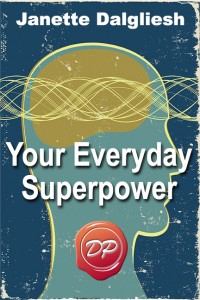Reviewed by Joelene Pynnonen
 What if everyone had the means and ability to make their lives better but they simply lacked the knowledge to do so?
What if everyone had the means and ability to make their lives better but they simply lacked the knowledge to do so?
This is the theory that Janette Dalgliesh posits in her short but hefty book, Your Everyday Superpower. Coming from a scientific background, she studies the theory of Deliberate Creation or the Law of Attraction (LOA). Though the two seem mutually exclusive, Dalgliesh argues that new scientific evidence into the human brain actually supports the subject of Deliberate Creation.
For four centuries, the accepted scientific theory had been that the brain was elastic during childhood but became fixed as people reached adulthood. Since the 1920’s however, some trail-blazing scientists found evidence to suggest that this theory was wrong. When Norman Doidge’s book, The Brain That Changes Itself, hit the shelves in 2007, it became more commonly perceived that our brains are far more elastic and incredible than we knew.
Your Everyday Superpower takes its theory a step further. If the brain (as Doidge and many others have provided substantial evidence for), can change a person’s perceptions by altering its thoughts, could it not then change the person’s very reality?
Your Everyday Superpower explores the extent to which we might be able to utilise our brains in order to make our realities better. Dalgliesh does not suggest that ‘like attracts like’ as many of the LOA theorists do. Rather, she makes the argument that reality is largely a state of mind and that altering our state of mind will alter our reality.
While a lot of the ideas here are interesting ones, the book itself is a little too compact to explore them in great depth. The logic of the book works well though. We’ve had a social awareness of the impact of positive and negative conditioning on the brain for quite a while now. Negative thoughts lead more deeply down a negative path, while positive thoughts can pull a person out of a bad situation. I’m on board for that.
 However, where the science merges with the concept of Deliberate Creation, I would have liked explained in more detail so I could take a stance on it. Nor am I sure how to put what I’ve learned into practice. I do like the idea of rewarding oneself for changing one’s thinking to something more positive. The thing I’m unsure about is the limitations of Deliberate Creation. Reality may be based on individual perception to a degree, but there has to be a limit?
However, where the science merges with the concept of Deliberate Creation, I would have liked explained in more detail so I could take a stance on it. Nor am I sure how to put what I’ve learned into practice. I do like the idea of rewarding oneself for changing one’s thinking to something more positive. The thing I’m unsure about is the limitations of Deliberate Creation. Reality may be based on individual perception to a degree, but there has to be a limit?
Your Everyday Superpower is a good introduction to both neuroplasticity and the LOA with an abundance of further materials to both read (and watch) throughout this book but also collated at the end. So, over the holidays I’ll be looking into a few of these TED talks to see if I can find out more about how to use my everyday superpower.
Your Everyday Superpower – Janette Dalgliesh
Difference Press (November 30, 2013)
ISBN: 9781936984299


































